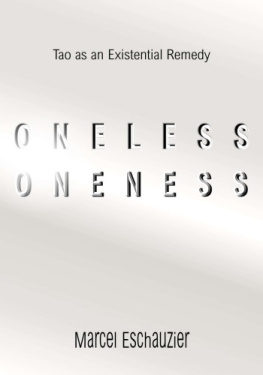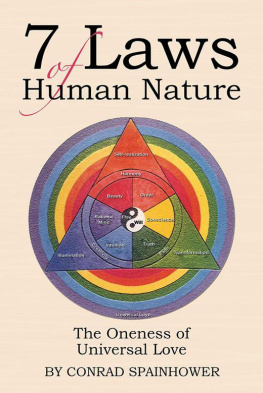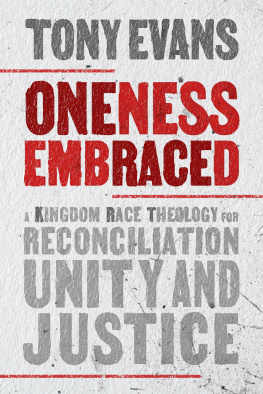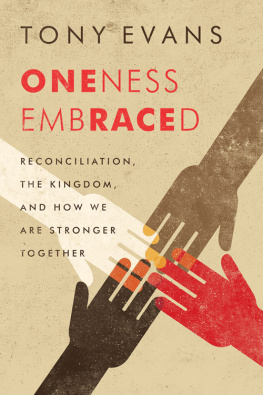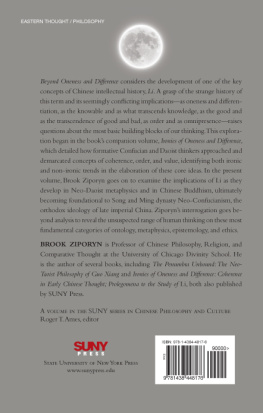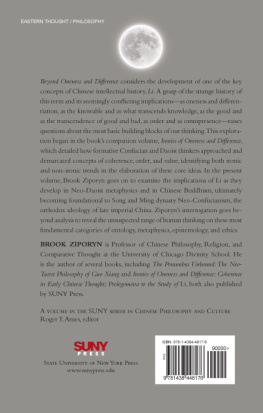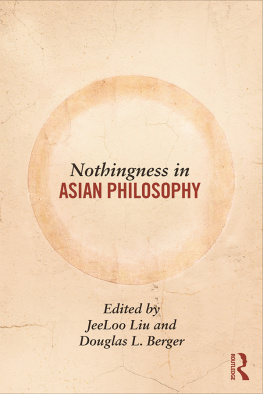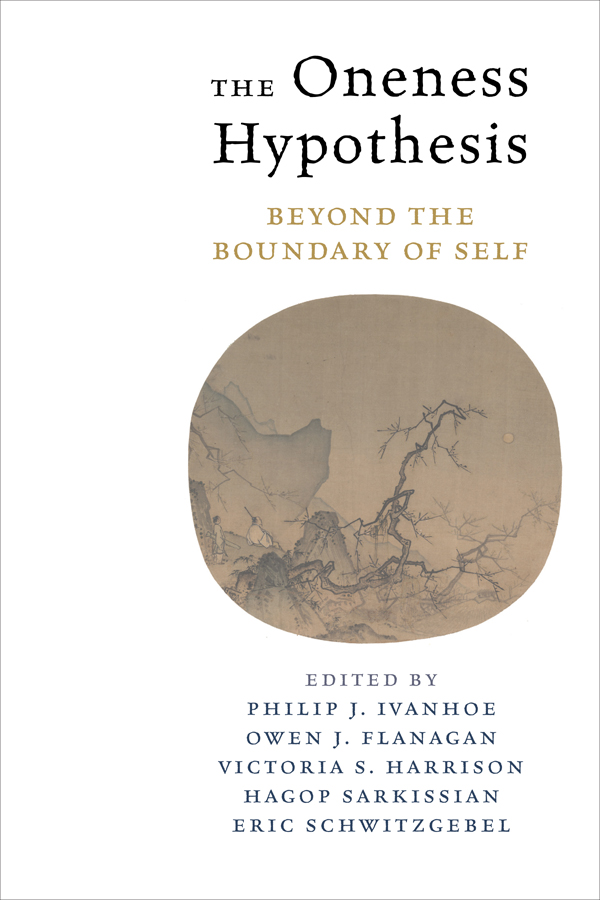Contents
Guide
Pagebreaks of the print version
THE
ONENESS
HYPOTHESIS
THE
ONENESS
HYPOTHESIS
Beyond the Boundary of Self

EDITED BY
PHILIP J. IVANHOE,
OWEN J. FLANAGAN,
VICTORIA S. HARRISON,
HAGOP SARKISSIAN, AND
ERIC SCHWITZGEBEL
Columbia University Press
New York

Columbia University Press
Publishers Since 1893
New York Chichester, West Sussex
cup.columbia.edu
Copyright 2018 Columbia University Press
All rights reserved
E-ISBN 978-0-231-54463-4
Library of Congress Cataloging-in-Publication Data
Names: Ivanhoe, P. J., editor.
Title: The oneness hypothesis : beyond the boundary of self / edited by Philip J. Ivanhoe, Owen J. Flanagan, Victoria S. Harrison, Hagop Sarkissian, and Eric Schwitzgebel.
Description: New York : Columbia University Press, 2018. | Includes bibliographical references and index.
Identifiers: LCCN 2018007434 | ISBN 9780231182980 (cloth : alk. paper)
Subjects: LCSH: Whole and parts (Philosophy) | Concord. | Monism. | Self (Philosophy) | Other (Philosophy) | Philosophy. | Religion.
Classification: LCC BD396 .O54 2018 | DDC 111/.82dc23
LC record available at https://lccn.loc.gov/2018007434
A Columbia University Press E-book.
CUP would be pleased to hear about your reading experience with this e-book at .
Cover design: Chang Jae Lee
Cover image: Ma Yuan, Viewing plum blossoms by moonlight , The Metropolitan Museum of Art, Gift of John M Crawford Jr., in honor of Alfreda Murck, 1986.
CONTENTS
PHILIP J. IVANHOE, OWEN FLANAGAN, VICTORIA HARRISON, HAGOP SARKISSIAN, AND ERIC SCHWITZGEBEL
VICTORIA S. HARRISON
TAO JIANG
STEPHEN R. L. CLARK
DONALD L. M. BAXTER
LAWRENCE BLUM
EVA FEDER KITTAY
MARK UNNO
BRADFORD COKELET
KENDY M. HESS
MICHAEL R. SLATER
CHO GEUNG HO
OWEN FLANAGAN
JAY GARFIELD, SHAUN NICHOLS, AND NINA STROHMINGER
HAGOP SARKISSIAN
ERIC SCHWITZGEBEL
SANAZ TALAIFAR AND WILLIAM B. SWANN, JR.
DIMITRI PUTILIN
JUSTIN TIWALD
For the first occurrence of Chinese, Korean, or Japanese names, we provide the Romanization in the relevant language, followed by the Chinese characters, for example, Zhu Xi , Cheondo , Buky.
W e, the editors, thank all of the contributors for their participation in the two international conferences that served as the original basis for this anthology: Oneness in Philosophy and Religion, organized by the Center for East Asian and Comparative Philosophy and held April 2527, 2015, at City University of Hong Kong, and Oneness in Philosophy and Psychology, also organized by the Center for East Asian and Comparative Philosophy and held May 1416, 2016, at City University of Hong Kong. We also thank them for their subsequent work revising and refining their contributions in conversation with us. The conferences served as the origin of all the papers collected here, and the lively, extensive, and insightful conversations that took place during and after this event helped to hone and polish these works into this splendid anthology. The editors gratefully acknowledge and express our sincere gratitude for the generous support of the John Templeton Foundation, which sponsored not only the conference but also the subsequent work compiling and editing this volume all as parts of a larger project titled Eastern and Western Conceptions of Oneness, Virtue, and Human Happiness (Grant ID 41879).
PHILIP J. IVANHOE, OWEN FLANAGAN, VICTORIA HARRISON, HAGOP SARKISSIAN, AND ERIC SCHWITZGEBEL
The Oneness Hypothesis
A number of East Asian and Western thinkers argue that, in various ways, the self is inextricably intertwined with, a part of, or in some sense identical with the rest of the world. In recent interdisciplinary work, this general idea has been described as the oneness hypothesis (Ivanhoe 2015). The relationship between the self and the rest of the world at issue is more than the simple claim that we are connected with other people, creatures, and thingsa claim that is not only in some sense obviously true but practically and morally ambiguous. At times, we find ourselves connected with other parts of the world to which we would strongly prefer not to be connected and have no obligation to be so united (think of malignant bacteria or tumors). The connections the oneness hypothesis advocates are those that conduce to the health, benefit, and improvement of both individuals and the larger wholes of which they are parts. This is why, as we shall see, the ideal of oneness often gets expressed by metaphors of natural organic unity and spontaneous activity, for example, about how a healthy person is connected to the various parts of her own well-functioning body.
While the oneness hypothesis is often described in terms of a loss of independence, self, or autonomy, the idea of organic unity shows this to be mistaken; the oneness that serves as the ideal is more accurately and helpfully understood as an argument for, or as providing ways to imagine and achieve, a more expansive conception of the selfa self that is seen as intimately connected with other people, creatures, and things in ways that conduce to their greater happiness, advantage, and well-being. In contemporary analytic philosophy, psychology, and cognitive science, this general issue is more commonly discussed in terms of the boundaries of the self, and versions of a oneness view are found in such areas as epigenetics and process ontology for organisms (Dupr 2014) in biology. Eric Scerri draws upon a notion of oneness that he rightly sees as an aspect of Eastern philosophy to propose an alternative account of the history of science in which the development of science should be regarded as one organic flow in which the individual worker bees are all contributing to the good of the hive (Scerri 2016, xxiv, xix). Kathleen M. Higgins, developing R. G. Laings insights about the importance of being ontologically secure, argues that music has the capacity to engender a greater sense of connection between the self and the world, including feelings of being at home in and supported by the world (Higgins 2012, 147). Recent work in the field of extended cognition also challenges traditional assumptions that the proper scope of the mind and by implication the self stops at the boundaries of the skin and skull (Chemero 2009, Menary 2010). The implications of such a view are quite remarkable and directly challenge accounts of the self that are found in a broad range of disciplines including (but not limited to) philosophy, religion, political theory, sociology, environmental studies, and psychology. This volume focuses on philosophy, religion, and psychology but draws upon other disciplines, such as evolutionary theory and cognitive neuroscience, when these are revealing or otherwise analytically helpful. This more expansive view of the self challenges widespread and uncritically accepted views about the strong (some would say, hyper) individualism that characterizes many contemporary Western theories of the self, but it also has profound implications for a range of practical concerns such as how we conceive of and might seek to care for the people, creatures, and things of the world.
The aim of this volume is focused on describing versions of the oneness hypothesis as found in a variety of philosophical, religious, and psychological writings, evaluating their plausibility, and exploring some of their major implications. We intend this anthology to serve as an important first step in the larger project of developing a new and psychologically well-grounded (Flanagan 1991) model for reflecting on conceptions of the good human life and, in particular, our relationship to and responsibility for the rest of the natural world that can inform and guide a wide range of disciplines in the humanities and social sciences. How would our view of ourselves change, and how would our approach and views about ethical, social, political, or spiritual life change, if we begin with the belief that we all are deeply and inextricably interconnected with other people, creatures, and things, and that our own flourishing and happiness is bound up with the well-being of the rest of the world?


